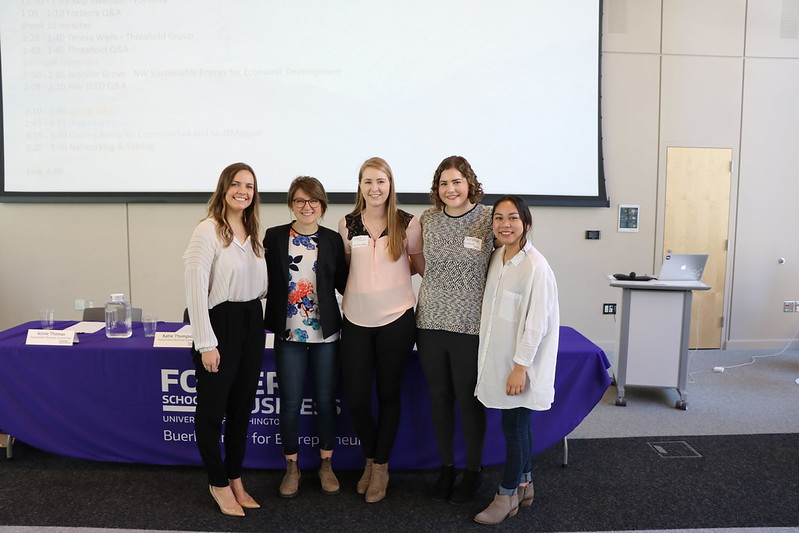
The third annual Resilience Summit, hosted by student group ReThink, gave attendees perspective on the intersection of business and sustainability. Though the event hosted speakers representing diverse interests, a common question became clear through conversation: how does one incentivize sustainability at a business and citizen level?
Katie Thompson and Annie Thomas of Sustainable Business Consulting (SBC) provided an overview of what sustainable consultation looks like, and how it can be of benefit to businesses. They made sure to point out that sustainability is a growing concern for the corporate world, with many companies wanting to find out what they can do to preserve the environment while keeping costs down. The sentiment is also apparent from the consumer end, as Katie and Annie related that 33 percent of customers desire products they know contribute or maintain social and environmental good. The two ended the discussion by advising current and aspiring professionals to pursue corporate social responsibility in the workplace, stressing that just because business practices have always been done a certain way, doesn’t mean they have to stay.
Skip Swenson of Forterra, an organization pursuing sustainable methodologies via land dealings, followed SBC to relate how his company secures and restores plots of land that help maintain local ecosystems in their virgin state. Seattle’s steadily increasing population has led Skip to advise the public to continue to look for new ways to save land from unsustainable development, despite environmental awareness being at an all-time high. One of Forterra’s goals is to build more structures made entirely out of wood-based substances in the Pacific Northwest; these composites are made from trees removed for land restoration and allow local communities to diverge from environmentally-damaging concrete materials while putting the land closer to its natural state.
Teresa Wells represented Threshold Investing Group (TIG), which tries to encourage investors and shareholders of major business to re-invest their funds into sustainable groups or practices. She explained how by advocating impact investing - investing into organizations with the intent to encourage or create positive social and financial change - TIG makes sustainable investments an imperative for investors and businesses alike. Fifty percent of the management positions at Teresa's business are held by women, which also has a record of accomplishment in hiring women in lower positions as well. A major theme of Teresa's talk was the importance of divesting in non-sustainable businesses, and then re-investing those funds into new industries trying to encourage sustainability in business.
Jennifer Grove of Northwest SEED talked about the importance of utilizing renewable energy at a local level. Founded in 2001, Northwest SEED tries to spark local action to address global climate change by helping to link citizens with solar powered devices. The group envisions a future of a Pacific Northwest in which every business, home, and public building is completely run on renewable energy. Jennifer stressed the fundamental importance of changing up the way business is done, and how legislation is written, to encourage citizens to shift to renewable energy resources. She also encouraged attendees to look to carbon pricing, clean air rules and the retirement coal power plants for simple ways to make big change. Still, it was clear that the cost effectiveness and simplicity of solar panel installation is the biggest, and most under-utilized, incentivize in moving away from non-renewable energy. As solar energy becomes more common, costs rapidly drop and large corporate entities like Target, Microsoft and Ikea choose to invest in solar installations over more-traditional power sources. Jennifer also made note of the importance of approaching solar energy at the grassroots level; by holding local meetings to discuss the benefits as well as cost effectiveness of solar energy, and encouraging peer to peer marketing, solar energy will only become more common as time goes on.
After presentations concluded, a joint panel was formed to create an inter-organizational discussion of the progress sustainability movements have made, as well as the barriers they still face. Audience members got the opportunity to ask questions directly to the panel, the answers to which often evolved into interdisciplinary approaches to problem solving. When the panel was finished, small breakout sessions were held so that the audience could interact with each speaker on a personal level. At this point dialogue spawned a more direct conversation, with the speakers themselves asking questions to students and professional attendees.
So, how does one incentivize sustainability from a business and citizen level? Based on this summit, the key seems to be in informing businesses and citizens what the direct benefits of a sustainable methodology are for them. Citizens must try to create an active presence within the sustainability movement, to show business leaders what they really want. By using sustainable resources in building practices and implementation of renewable energy in domestic settings, everyday citizens can begin to influence the structure of corporate practices for the better. Corporations need to realize that environmental good is a growing concern for their consumer base, and that to best serve their customers they must pursue an ideology of social responsibility in the future. This may look like the implementation of green energy sources such as solar, or even the divestment of major funds from environmentally damaging processes in favor of putting stock in sustainable practices. In the end, it becomes clear that this is not an issue that can be solved only by the citizens or businesses alone, but through dynamically expansive efforts involving concentrated effort from both sides.
